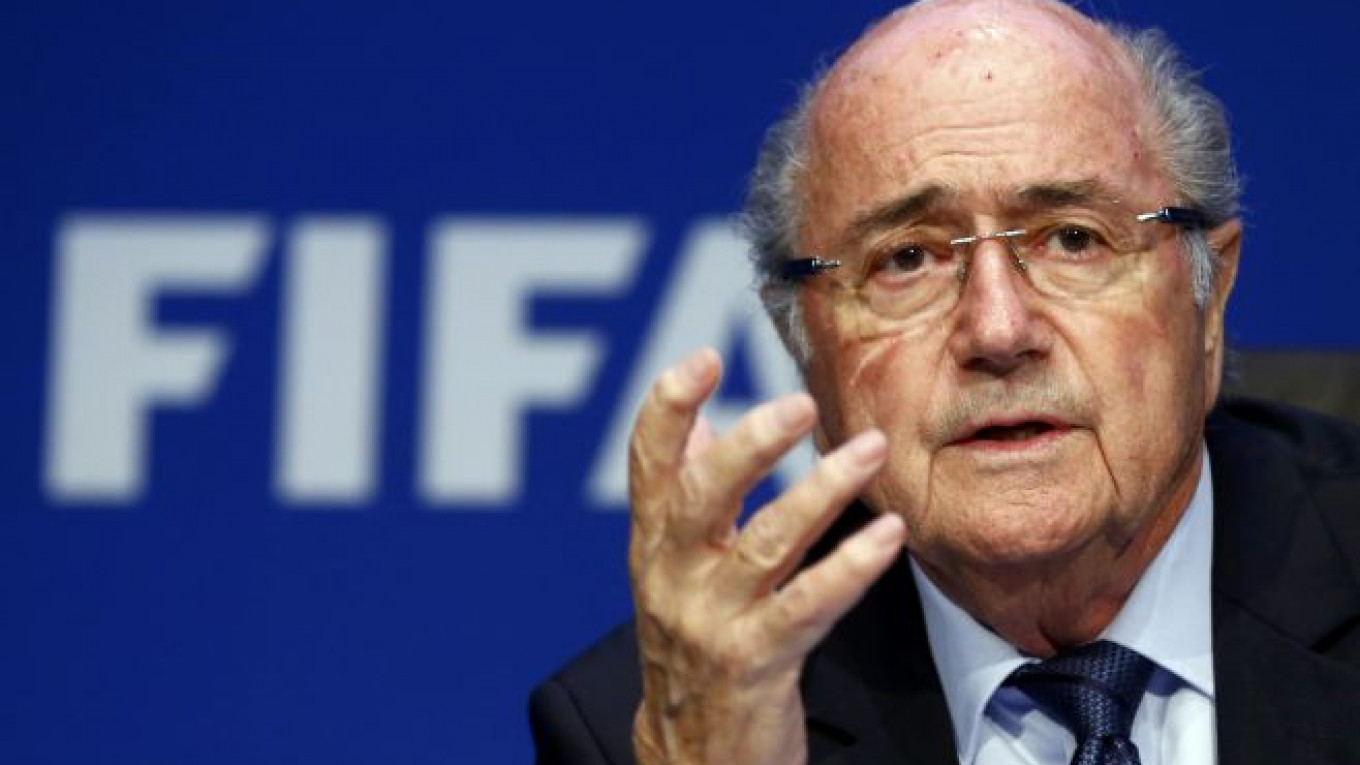This article was originally published before Sepp Blatter announced his resignation late Tuesday evening.
Only two days separated the re-election of incumbent FIFA President Joseph "Sepp" Blatter and the dismissal of Russian Football Union (RFS) President Nikolai Tolstykh. Both events made headlines, and although Blatter continues at his post amid the biggest scandal in FIFA history, President Vladimir Putin had no qualms about congratulating him. However, the fact that scandals and conflicts are rocking both organizations does not mean the same problems are afflicting both.
Union of European Football Associations (UEFA) President Michel Platini urged the postponement of the elections. In fact, in the first round of voting most European countries voted for Blatter's rival, Jordanian Prince Ali bin Hussein.
That was an expression of dissatisfaction with the current European system of distributing income and profits. In all, FIFA took in $5.7 billion in 2011-14, $2 billion in 2014 alone. That total represents a $1.5 billion, or 35.7 percent, increase over the previous four-year period, and yet FIFA earned net profits of only $338 million during the most recent period, as compared to $631 million in 2007-10.
Europeans are unhappy that ever greater sums are spent on preparation for the world championships without properly analyzing the effectiveness of those investments. In 2014, FIFA expenditures totaled $1.96 billion, 80 percent more than the $1.09 billion spent in 2010.
Following the World Cup in Brazil, it turned out that some of the stadiums built for that event would go unused, while others would require renovation due to hasty and poor quality construction. In addition, the principles by which FIFA allocates and spends its reserve fund remain far from transparent.
According to Sports.ru general director Dmitry Navosh, Blatter's re-election ignores the wishes of the leading football countries of Europe and the UEFA. Former RFS President Vyacheslav Koloskov suggests that the disagreement could lead to a schism between FIFA and Europe, that Blatter should not dismiss the grievances of European states, but begin negotiations with them. Otherwise, he says, the UEFA and European states might reconsider their participation in competitions held under FIFA auspices, including the Intercontinental Cup.
Considering that FIFA earns 43 percent of its income from the sale of television broadcast rights to its games and another 29 percent from the marketing of those games, that argument carries some weight. Something similar happened with professional basketball in the early 2000s when leading European clubs, national associations and the NBA in the United States refused to pay dues to FIBA — basketball's equivalent to FIFA — and began independently holding more profitable club competitions, particularly the Champions League.
Russian football faces a different problem: the RFS is in deep crisis. In late May, it was 1.4 billion rubles ($26.7 million) in debt. The crisis is the result of Russia's semi-feudal system for governing and financing football. Russian clubs and teams prosper not because they play well, fill their stadiums with fans or attract large television audiences, but only if governors and the heads of major private and state-owned companies feel motivated to fund them.
When former RFS President Nikolai Tolstykh was voted into office in 2012, he inherited from his predecessor, Sergei Fursenko, an organization suffering from serious neglect. However, he lacked the political will and support to reform Russian football.
He also lacked administrative resources to attract the money needed to make the system work according to the existing model. In all likelihood, state officials will team up with key sponsors of the World Cup 2018 to name Tolstykh's successor, and will make no effort to reform the system. But with that backing, the new president will have the option of writing off RFS debt and attracting big money.
Pavel Aptekar is a historian and commentator for Vedomosti. This comment originally appeared in Vedomosti.
A Message from The Moscow Times:
Dear readers,
We are facing unprecedented challenges. Russia's Prosecutor General's Office has designated The Moscow Times as an "undesirable" organization, criminalizing our work and putting our staff at risk of prosecution. This follows our earlier unjust labeling as a "foreign agent."
These actions are direct attempts to silence independent journalism in Russia. The authorities claim our work "discredits the decisions of the Russian leadership." We see things differently: we strive to provide accurate, unbiased reporting on Russia.
We, the journalists of The Moscow Times, refuse to be silenced. But to continue our work, we need your help.
Your support, no matter how small, makes a world of difference. If you can, please support us monthly starting from just $2. It's quick to set up, and every contribution makes a significant impact.
By supporting The Moscow Times, you're defending open, independent journalism in the face of repression. Thank you for standing with us.
Remind me later.







